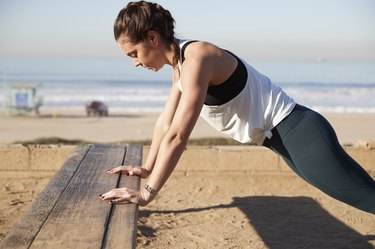
Any good workout will leave you breathing hard. However, if you experience tightness or chest pain after exercise, there might be a problem. In fact, tightness in the chest after exercise could be a sign of a serious medical condition that requires immediate treatment.
If you have feelings of pressure or pain, contact your doctor right away.
Video of the Day
Video of the Day
Read more: Why Does My Chest Feel Tight When I Run?
Exercise-Induced Asthma
Asthma is sometimes the cause of tightness or pain in the chest following exercise. In some people, asthma is actually exercise-induced — also called exercise-induced bronchoconstriction or EIB says the American Academy of Allergy, Asthma and Immunology — so you may not experience symptoms at any other time than when working out. Taking rapid breaths during exercise causes inflammation in the lungs, leading to swelling, which makes it hard to breathe deeply. This creates a sensation of tightness in the chest. EIB can occur within five to 20 minutes after exercising. If you think you have asthma, see a doctor right away for treatment.
Read more: How to Build Cardio Stamina When Your Have Asthma
Pulled or Strained Muscle
You may simply have pulled or strained a muscle. Exercise taxes your muscles, and the act of breathing deeply and rapidly when running, for instance, could stress the muscles that run across your chest. This can create a sensation of pressure or pain after you work out. It's natural to hunch your shoulders and concave your chest in a very natural human reaction to pain. This may exacerbate the pain. Slow your breathing, relax your shoulders and slowly expand your chest exaggeratedly. However, if the tightness is accompanied by pain in your arms, tingling or dizziness, contact a medical professional right away.
Pleurisy and Chest Pain
Pleurisy involves a sharp chest pain that worsens when you try to inhale or cough says Mayo Clinic. There are two layers of tissue — one that lines the inner cavity of your chest and one that surrounds the lungs. Breathing hard and being physically active can irritate the membrane that lines the chest cavity and covers the lungs, which leads to sharp pains and pressure in the chest. If you have a pleural effusion, where fluid has seeped between the two layers of tissue, the pain may subside. But, sometimes a large amount of fluid can collapse or partially collapse your lung. Pleurisy can be a symptom of an underlying medical problem, so advise your physician should you experience it after exercise.
Heart Issues or Heart Attack
Heart issues are what are most commonly associated with tightness in the chest after exercise or even while at rest. If you experience a tight feeling or pressure in the chest after a workout, it could be angina, a condition that causes the arteries in the heart to restrict and cause pain. Chest tightness could also be due to a heart attack, which occurs when the arteries constrict to the point of fully blocking blood flow to the heart say Mayo Clinic. In either case, immediate medical attention is required.
Was this article helpful?
150 Characters Max
0/150
Thank you for sharing!
Thank you for your feedback!